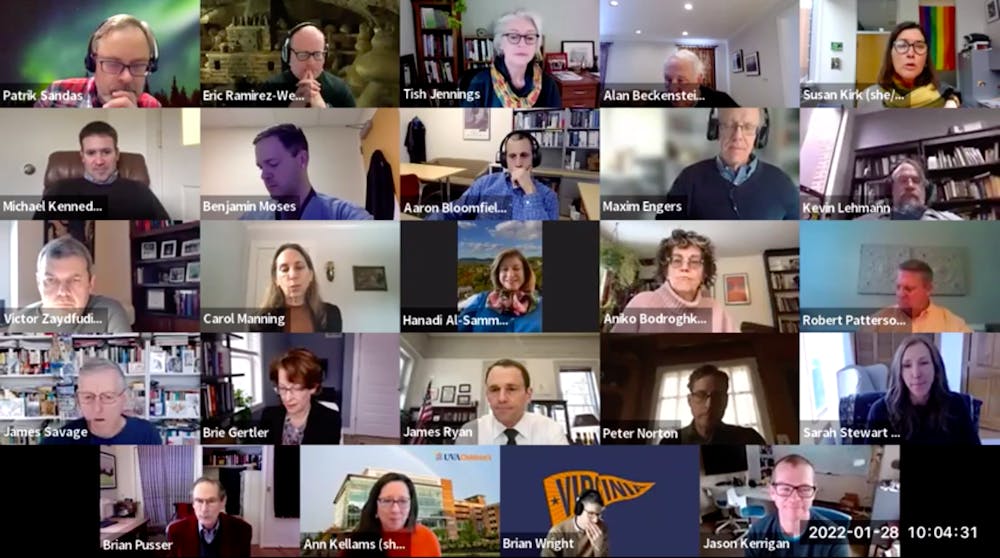Over 40 faculty senators convened Friday afternoon to discuss the appointment of Ian Baucom, dean of the College of Arts and Sciences, as the next provost. Faculty spent much of the meeting expressing concerns over the University’s failure to maintain standard best practices for appointing a high-level administrator, particularly safeguards designed to ensure diversity and inclusion in hiring.
The University announced the departure of Provost Liz Magill and Baucom’s appointment Jan. 13. Magill has served for more than three years as provost and will become president of the University of Pennsylvania starting July 1. Baucom has served as the dean of the College since 2014. His accomplishments include introducing the new College curriculum, forming the Democracy Initiative and recruiting over 150 faculty hires.
The provost plays a crucial role in University academics, overseeing curriculum development and budgetary decisions for academic units. Baucom will also have oversight of the University’s faculty —- including hiring, measuring performance, granting tenure and issuing promotions. The provost also works closely in conjunction with the Faculty Senate to make any decisions impacting academics at the University.
The meeting began with remarks from Ryan on the reasoning behind appointing Baucom without a formal search for a replacement. In this instance, Ryan said administration chose not to conduct a search for two reasons.
“I chose not to do a search for two interrelated reasons,” Ryan said. “First, because provost is a unique position in my view, and second, because there were unavoidable time pressures that required me to act quickly.”
Typically, the hiring process for a high-level administrator begins with a public posting through the University’s Human Resources department. Though not required by official policy, it has been typical practice for Ryan to appoint a search committee to identify qualified candidates and solicit applications. Ryan and the Board of Visitors make the final decision of whom among the candidates to appoint.
At every step in the search process, the University’s Office of Equal Opportunity and Civil Rights works with a breadth of individuals — hiring officials, search committee chairs, human resource staff and the Office of the Executive Vice Provost — to enforce compliance with policies ensuring that a range of candidates are fairly considered for open positions. A public search process in tandem with the OECC legally binds the University to provide equal employment opportunities and provides for the solicitation of a more diverse range of candidates.
Ryan told the Senate that three factors come to mind when evaluating provost candidates — the individual should be a proven leader, they should know the University and be someone Ryan knows he can work well with.
“The provost [and] president relationship is an intense one, and for it to be successful you have to be able to work well together,” Ryan said.
As an additional consideration this year as the University attempts to resume full-functioning at the two-year mark of the COVID-19 pandemic, Ryan said he thought it unwise to halt momentum while conducting a search.
Finally, Ryan said he found out Baucom was being heavily pursued by another school to serve as provost. Concerned that Baucom would accept the job, Ryan said he appointed Baucom quickly in part because he feared losing him as a faculty member.
However, Ryan acknowledged that in appointing Baucom to secure his continued employment at the University, faculty and staff input was excluded.
“You may not agree with that way of proceeding, but that’s what led me to do what I did,” Ryan said. “I’m sorry if this has caused some of you to doubt my commitment to shared governance — I believe in it deeply. I hope that over the last three and a half years, Liz and I have demonstrated that we believe about it deeply and I very much value the relationship that we’ve developed with the Faculty Senate.”
Economics Prof. Maxim Engers questioned the departure from standard procedure, which he views is designed to ensure equality of opportunity and a diverse range of perspectives throughout hiring processes.
“The kind of hiring that we have to do is constrained by lots of rules and we fully understand their purpose — to ensure things like equal opportunity and to ensure that people from diverse backgrounds are included in the search,” Engers said. “To hear that those principles are something that can be given up in circumstances like that is something that just amazes me and my colleagues.”
Education Prof. Tish Jennings also voiced concern on behalf of the Education staff that the appointment of Baucom is a symptom of a larger problem — increasing opacity in the University’s hiring process. In the Education School hiring processes, Jennings said faculty interactions with potential hires has decreased, as hires are conducted behind closed doors with search committees maintaining confidentiality.
“This tendency is undermining the principles of shared governance in our stated commitment to diversity, equity and inclusion,” Jennings said.
Eric Ramirez-Weaver, associate professor of art and director of the medieval studies program, emphasized the importance of clear and open communication between Baucom in his new position and the faculty members.
“I think that one of the most productive conversations we’ll have to have is to encourage a kind of collaboration which Ian at least has always said he wishes to cultivate,” Ramirez-Weaver said. “At the same time, we’d like to see some practice [of that collaboration].”
The next Faculty Senate meeting will be held Feb. 7 on Zoom.
CORRECTION: The article previously misquoted Economics Prof. Maxim Engers as saying "The kind of hiring that we have to do is constrained by lots of tools and we fully understand their purpose." Engers actually said "The kind of hiring that we have to do is constrained by lots of rules and we fully understand their purpose." The article has been updated to correct the error.







